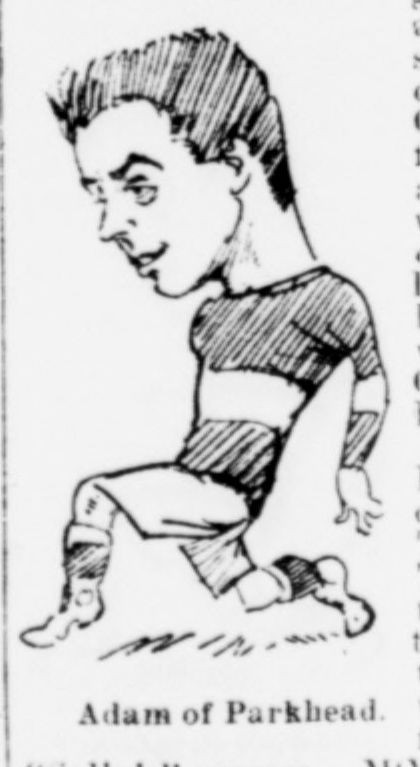Match Pictures | Matches: 1922–1923 | Pictures: 1922–1923
Trivia
- The Glasgow Herald lauds Willie McStay whose “power and pertinacity that made him the personality of the game”. LINK
- The Herald also covers the story of Hilaire Belloc who gave a talk at the Burgh Halls Dumbarton.
- Another meeting reported in the Herald was that of Captain Gipsy Pat Smith at Greenock who recalled spending time at Little Dublin there.
- Celtic wore a very rare top on the day, see below. Broad striped Green & White Hoops!
Review

27 October 1923 @ Ibrox…
2nd half.
In a match marred by incidents off the pitch including the mass arrest of a Celtic brake club for supposed public disturbance, Celtic draw with Rangers in a keenly-fought contest.
Teams
RANGERS: Robb, Manderson, McCandless, Meiklejohn, Dixon, Johnstone, Tully Craig, Cunningham, Henderson, Muirhead, Morton
CELTIC: Shaw, McNair, Hilley, J, McStay, W. McStay, McFarlane, McAtee, Gallacher, Cassidy, Thomson, McLean.
Referee: P Craigmyle (Aberdeen)
Attendance: 38,000
Articles
- Match Report (see end of page below)
Pictures
- Match Pictures
Articles
Glasgow Herald 29th October 1923
Match report from The Scotsman, 29th October 1923
NEARLY 40,000 AT IBROX
While there is no doubt that the Rangers were superior in team work, and did three-fourths of the attack, the Celtic defence stuck to their guns so well that no one could grudge the Parkhead club for a division of the points. For long portions of the game play was all around Shaw, but seldom, indeed, could the Rangers’ forwards open out the defence. On two occasions luck was with the Celts. In the first half Morton went clear away from McNair, and crossed to Henderson, who was just a fraction late, and in the second half Morton had Shaw well beaten when a ball struck the inside of the post. Any chance Celtic had of winning came near the end, when the Rangers’ forwards tired a little. The absence of Archibald meant a good deal to the Rangers, for Craig, though he did very well, could not carry the ball at outside-right as Archibald does. The conditions were not too good, the wet ball preventing the Rangers getting their usual work on it. Gallacher and McLean were outstanding for the Celtic, but the forwards did not combine so well as did the Ibrox quintette. It was a hard, interesting match, with the issue in doubt to the last kick. The attendance would be 38,000.
The Glasgow Herald, 29 Oct 1923
The Ibrox Game
Rangers for the first time in six weeks failed on Saturday to return a victory, their rivals from Parkhead forcing a draw and consequent division of points upon the League Champions. This check upon Rangers’ progress, however, did not have the full beneficial effect upon the competition as was hoped for, as Partick Thistle, who were the nearest challengers to the Ibrox club, met with a reverse in Edinburgh. The result at Ibrox Park nevertheless appreciably improved the outlook by bringing Celtic once again into the running. It is true that the famous East-End club are still four points behind the leaders, who in addition have a game in hand, but Celtic have overcome a greater handicap than that in the past, and it is quite possible, and indeed probable, that the return game at Celtic Park on New Year’s Day will find the two clubs who have for so long monopolised the League honours alone involved in the struggle for supremacy. In Saturday’s game Celtic did not exactly reveal a return to the superlative play so long associated with their name, but they certainly approached nearer to the leaders’ class than any other competitor who have this season opposed the redoubtable Rangers’ team. The absence of two such capable players as Cairns and Archibald no doubt handicapped Rangers, but there were periods, and notably in the half-hour following the interval, when Rangers played as well as they have done in any game this season, yet they failed to break down the Celtic defence. To that section of their forces Celtic principally owed the comparative success they gained and deserved, and none distinguished himself so highly as W. McStay at centre half-back. This versatile defender repeatedly broke up the close combination of the Rangers’ inside forwards, and defended the goal with a power and pertinacity that made him the personality of the game. With the exception of the half-hour’s dominance of Rangers’ forwards referred to it was a level game between two sides, wonderfully matched, and if the Celtic goal escaped luckily once, when a shot from Morton beat Shaw and rebounded from the upright, the visiting team in a closing rally balanced matters by determined raiding that placed Rangers’ goal in jeopardy. Under the adverse conditions it was altogether a stirring contest, fought cleanly, and to the satisfaction of the 35,000 onlookers—a splendid turnout on such an inclement afternoon, and reassuring to those who were inclined to think that the time-honoured meetings of the great rivals had lost their fascination.
